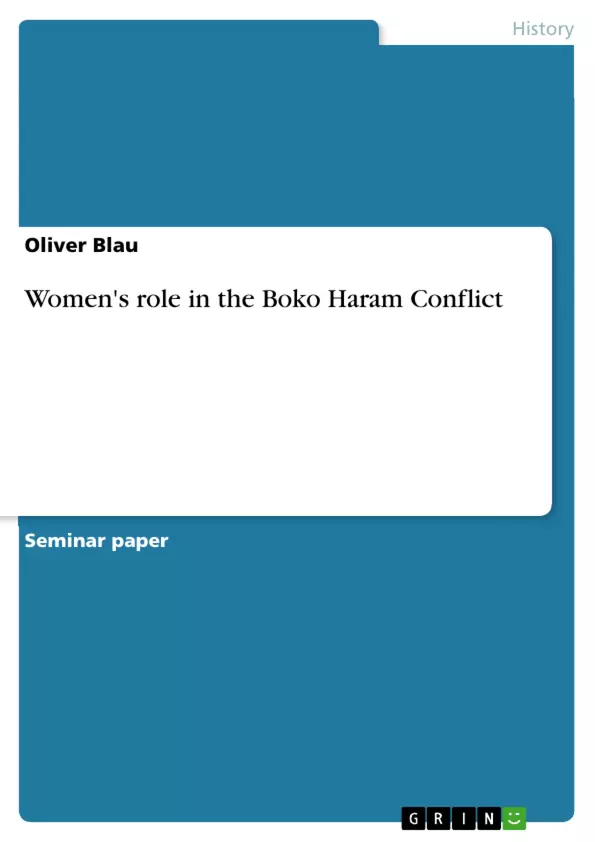Women have always played a crucial part in Westafrica. In comparison with their African and European counterparts, they had emancipated themselves relatively early. In colonial times it was they who led the protests against colonial authorities. This paper is about the rise of the terrorist organization Boko Haram and women's role in this new conflict in post colonial Nigeria.
Inhaltsverzeichnis (Table of Contents)
- Introduction
- Historical Background
- Islamic Movements in Nigeria's History
- Boko Haram
- Boko Haram's Ideology
- Feminist Movements in Nigeria's History
- Islamic Movements in Nigeria's History
- Women at crossroads
- Counterterrorism
- #BringOurGirlsBack'
- BAOBAB for Women's Human Rights
- Women Without Walls Initiative
- Women's involvement in Vigilante groups
- Women involved in Boko Haram Activities
- Consequences
- Counterterrorism
- Conclusion
Zielsetzung und Themenschwerpunkte (Objectives and Key Themes)
This research aims to analyze the complex interplay between Islamic movements, feminist movements, and the role of women in contemporary Nigeria, specifically within the context of the Boko Haram insurgency. It seeks to understand how historical and ideological factors shape the experiences of women in this conflict.
- The historical evolution of Islamic and feminist movements in Nigeria
- The impact of the Boko Haram insurgency on women
- The emergence of counterterrorism movements in response to the insurgency, particularly those focused on women's rights
- The diverse ways women are involved in the Boko Haram conflict, both as victims and actors
- The social and political consequences of the insurgency on women's lives
Zusammenfassung der Kapitel (Chapter Summaries)
- Introduction: The introduction sets the stage by highlighting the devastating impact of the Boko Haram insurgency on women and children in Nigeria. It emphasizes the need to understand the historical context of both Islamic and feminist movements in the region to fully grasp the present situation.
- Historical Background: This chapter examines the historical development of Islamic and feminist movements in Nigeria. It traces the influence of Islamic movements in the region from the 14th century onward, highlighting key figures and events, particularly the emergence of the Sokoto Caliphate and the rise of the Maitatsine movement. The chapter also provides a brief overview of feminist movements in the country.
- Women at crossroads: This chapter focuses on the impact of the Boko Haram insurgency on women in Nigeria. It explores the emergence of counterterrorism movements like #BringOurGirlsBack and the efforts of women's rights groups to address the crisis. The chapter also analyzes the complex role of women in the Boko Haram conflict, including their involvement in the insurgency and the consequences they face.
Schlüsselwörter (Keywords)
The main keywords and focus topics of this research are: Boko Haram, Islamic movements, feminism, women's rights, counterterrorism, #BringOurGirlsBack, insurgency, Nigeria, social consequences, political context, women's involvement, historical analysis, ideological perspectives. This study investigates the multifaceted issues surrounding the Boko Haram insurgency in Nigeria, focusing particularly on the impact and agency of women within this complex and challenging context.
Frequently Asked Questions
What is the historical role of women in West Africa?
Women in West Africa emancipated themselves relatively early and were leaders in protests against colonial authorities during colonial times.
How has the Boko Haram conflict affected women in Nigeria?
The conflict has placed women at a crossroads, where they are both victims of violence and active participants in counterterrorism or the insurgency itself.
What is the #BringOurGirlsBack movement?
It is a prominent counterterrorism and advocacy movement that emerged in response to the kidnapping of schoolgirls by Boko Haram.
Are women involved in Boko Haram's activities?
Yes, the research analyzes the complex role of women who are involved in Boko Haram activities, exploring the ideological and historical factors behind it.
What are the social and political consequences of the insurgency?
The insurgency has led to significant social displacement, human rights challenges, and a shift in the dynamics of feminist and Islamic movements in Nigeria.
- Quote paper
- Oliver Blau (Author), 2016, Women's role in the Boko Haram Conflict, Munich, GRIN Verlag, https://www.hausarbeiten.de/document/355683


